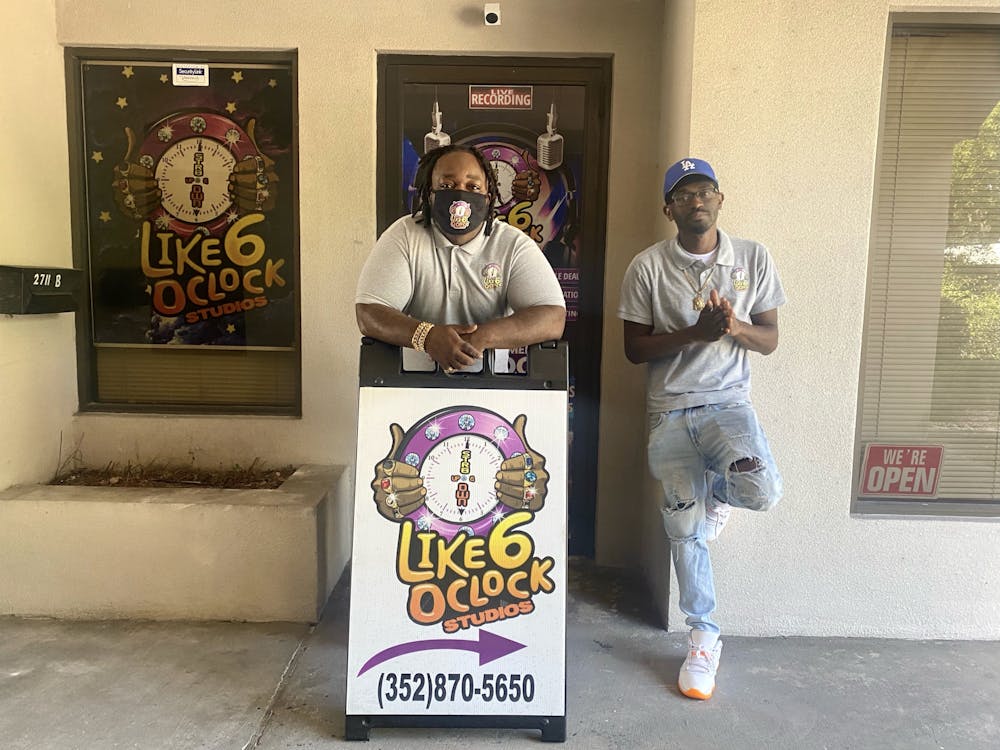When Timothy “Tee Whitey” White converted his heartbreak poems into raps at 16 years old, he didn’t realize getting sold false dreams and scammed out of contracts throughout his career, would lead him to help upcoming artists avoid the same fate.
The Gainesville musician shifted gears to create a safe haven for up-and-coming musicians to learn all facets of success in the music industry.
“The importance to me is to not let the artists get frustrated; to know that there is somebody that is not just trying to get in your pocket,” White said.
With two locations in Gainesville, White’s studio, Like 6 O’Clock Studios, is the product of one musician's disoriented walk through the music industry and his dedication to ensure a solidified path for others. The studio name, describing a clock when both hands form a straight line, represents a lifestyle and business that cuts no corners.
Under a whimsical ceiling of floating records and pops of colorful neon light, the studio houses recording booths and expansive common areas. With couches and TV screens constantly whirring familiar movies, Like 6 O’Clock Studios is a balance between eccentricity and nostalgia.
It’s more than a studio, White said. It’s an entertainment school.
Like 6 O’Clock Studios offers classes in song engineering, photography and videography, artist development and, soon, producing.
White visited Full Sail University, a private school in Winter Park known for degrees in entertainment, media and arts, in 2017.
“When I was there, I was like, ‘Oh my goodness, this is the lane I want to go, but without being so expensive,’” White said.
From registering artist names to navigating the reverb process, White wants to simplify the complexities of music-making so every artist can zero in on their craft. Unlike the classes at Full Sail, classes at Like 6 O’Clock Studios are almost always one-on-one.
With hardly any money to support his expansive music dreams, White taught himself the ins and outs of the music industry. He absorbed knowledge on everything from video editing to engineering.
Though White believes his mistakes made him the person he is today, he desires something better for young creatives in the area.
“I wanted to do something that gave back and taught the things that I wasn’t taught,” White said. “Little things that could have saved me a whole year’s worth of aimlessly grinding.”
He hopes to foster an improved environment of trust with his musicians — one he didn’t have at the beginning of his career. White worked in many uncomfortable studios throughout his career.
People frequently interrupted his recordings, and he couldn't decipher if the laughter in the background was aimed at him.
He wants blooming artists to know they are taken seriously at Like 6 O’Clock.
Oriana Sheffield, known artistically as IamOri, has worked with White as her mentor since the first studio location opened downtown last year. As a female artist, Sheffield says she heavily values creative control and comfort in the studio — something Like 6 O’Clock offers her.
Parker Wright, a 20-year-old recording engineer, found professional work for the first time at Like 6 O’Clock Studios. Wright only ever made music at home, but White saw his potential after he took the reins in his recording session.
Wright already knew the fundamentals of mixing and recording, but he said White offers him opportunities and learning experiences that can lead to exponential growth in the industry.
“You can’t do anything without help,” Wright said. “Everybody is going to have people who help them out throughout life to really get anywhere.”
The first step to advancing in the industry is making good music, Wright said, but many musicians forget success in the field also requires business savvy. Like 6 O’Clock aids artists in this area, he said.
“Whitey is somebody who has all the knowledge it takes because he’s done it and he’s a really good person,” Wright said.
White is thankful his struggles created opportunities for others. He said he’s been rewarded with the chance to be a role model to a community of rising musicians.
“Why not give back to them and show them the real music business and not the facade?” White asked. “Yes, it looks all glamorous and glittery, but you don’t know what’s going on behind the scenes.”
Contact Averi at akremposky@alligator.org. Follow her on Twitter @averijkremposky.

Averi Kremposky is a senior journalism major at the University of Florida. When she’s not covering music, art and culture beats for The Avenue, you can find her going to a concert, finishing another book in one sitting or submitting to the latest Taylor Swift album theory.






